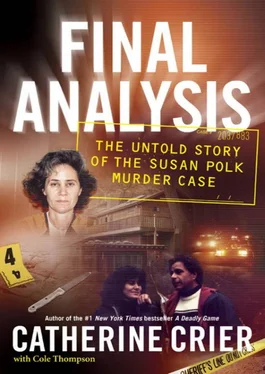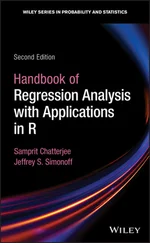“Objection, your honor,” Susan yelled out. In a lawyerly tone, she informed the prosecutor that she was objecting to him raising his voice during his “diatribe” and for taking “inappropriate personal potshots” at her.
“Maybe he should start acting like a lawyer instead of being a baby,” she goaded.
It was an amusing quip and one that underscored the increasingly hostile relationship between Sequeira and Polk. For days now, Susan had been inciting direct arguments with the prosecutor, and Brady had done little to stop it. Like two siblings who loathe the sight of each other, they bickered back and forth instead of trying the case. In what was becoming the most entertaining aspect of the trial, Sequeira was routinely drawn into arguments with Susan. While her repeated objections were quite disruptive, it was surprising that she was so successful in eliciting a reaction from the seasoned lawyer.
The more she interrupted the court, the more it seemed that her actions were part of some coherent strategy, not just idle comments meant to annoy the prosecutor. While her behavior was clearly ruffling his feathers, it was also distracting him from his arguments and disrupting the flow of discussion for the jury. Perhaps looking back on Sequeira’s case during their deliberations, the jury would become confused by seemingly inconsequential and incomplete testimony. If intentional, this strategy’s effectiveness would not be known for months, but one thing was certain: by reacting to Susan, Sequeira was playing right into her hand, allowing her to dictate the pace and manner in which the case was progressing.
During the afternoon questioning, Susan probed Gabriel about his relationship with Marjorie and Dan Briner, his surrogate parents since Felix’s death.
“I consider myself their foster child,” Gabe told his mother. “I consider them my parents.”
Gabe’s remarks clearly rattled Susan. She immediately objected to his characterization, insisting that Gabe was not a foster child, as that term is legally defined.
“I am doing extremely well now,” Gabe next told Susan.
Fueled with rage, Susan sought to paint the Briners as greedy individuals who were trying to cash in on her son’s circumstances. She claimed that they held Gabe back in high school so that they could continue to collect social security benefits. “Isn’t it so that if you hadn’t been held back a year at school, your Social Security benefits would have ended when you turned eighteen?”
“You have no idea what you’re talking about,” Gabe said, holding back tears.
Gabe told the court that initially he gave the Briners his entire twelve hundred dollar Social Security check. More recently, he paid half the money to help cover his room and board.
As the day wore on, Susan grew more and more confrontational. She demanded yes or no answers from her son and continued to pursue topics that were irrelevant to the murder case. Disturbingly, she grilled him about his alleged hatred of Felix.
“Didn’t you say you wanted to ‘gut him’?” Susan asked tearfully.
“No, God no, I never said that.”
“Didn’t you express absolute hatred of your father?”
“I’ve made mistakes. I have to live with that,” he said, anxiously rubbing his forehead. “It’s not easy that he’s dead, that I can’t say I’m sorry.”
It was just before 5 PM when Gabriel Polk finally rose from the witness chair and waved good-bye to jurors. “See you later,” he said, exiting the courtroom.
“I call for a mistrial!” Susan shouted, citing her son’s banter with the jury.
On Wednesday, the crowd in the gallery had dwindled for Sequeria’s second witness, former Orinda Police Chief Dan Lawrence. The prosecutor had rearranged his witness list to accommodate Adam Polk’s vacation plans. He would call Susan’s eldest son later in the trial and forge ahead with testimony from members of law enforcement.
Lawrence, who was now the chief of a neighboring police department, was called to testify to the phone call he received from Felix Polk one week before his murder. During the call, Felix claimed that Susan had “threatened to blow his head off.”
Sequeira’s examination of Lawrence lasted just five minutes, however, Susan kept the law enforcement officer on the stand for more than one hour, arguing that Lawrence was an expert on police protocol and had expertise on domestic abuse cases. It seemed she was anxious to introduce jurors to the idea that victims of domestic abuse don’t always report incidents to police, thus explaining why she had not reported the alleged abuse she now claimed occurred throughout her marriage.
“Isn’t it true that women who are victims of domestic abuse back out, get scared, fail to appear, and make bad witnesses?” Susan asked Lawrence.
The police chief agreed, saying that Susan’s scenario was possible.
Seemingly pleased with Lawrence’s response, she next asked him why her husband wasn’t prosecuted for his knowledge of underage drinking parties at the Miner Road house. She also wanted him to explain how Felix’s influence with people in high places might have spared him from being charged.
Lawrence was unable to answer many of Susan’s questions, including a number that stemmed from a letter she wrote to Moraga police complaining about their search of her home after Eli’s arrest on felony assault charges. The letter alleged that officers had roughed her up, handcuffed her, and threatened to tear her house apart, thus coloring her perception of the police department and leaving her distrustful of law enforcement officers.
Susan argued that it was her mistrust of police that caused her to flee to Montana—instead of reporting Felix’s murderous threats to authorities. She wanted to introduce her “state of mind” through Chief Lawrence. Susan had sent him a copy of the letter and was anxious to introduce it into evidence.
But Judge Brady ruled that she could not question the police official about the search warrant because he was not there. Susan’s accusations in the letter amounted to “hearsay” and could not be proven through this witness. Nevertheless, Susan ignored the judge’s instructions and continued her line of questioning.
Once Chief Lawrence had been excused, Susan questioned several more police witnesses, using their testimonies to present her theory that the sheriff’s deputies had contaminated the crime scene by pouring water over Felix’s head to make the dried blood look wet and to make his death appear more grisly. “Doesn’t that look like a puddle of water next to my husband’s bloody scalp?” Susan asked Sheriff’s Deputy Melvin Chamblee, one of the first officers on the scene. According to her, their carelessness and poor police work had resulted in a crime scene that looked much more like murder than the self-defensive struggle that Susan claimed it was.
She accused police of sloppy work, pointing out that officers were not wearing protective booties when they examined the crime scene. In addition, she also insisted that a photo of bloody footprints found at the scene appeared to depict two right feet, side by side. Meanwhile prosecutors maintained the footprint belonged to Susan and was the same size as the shoes found in her bedroom closet.
Dressed stylishly in a tan and green tartan kilt skirt, Susan looked lawyerly as she stood at the podium and thumbed through her papers. Displaying a photo of the bloody footprints found at the crime scene, she asked Chamblee if he saw, “two right feet.”
The deputy studied the photo, and then hesitantly agreed that it was possible, although he could not be sure.
To Susan, Chamblee’s uncertainty confirmed her claims of a tainted crime scene. Seeming pleased with her momentary victory, she shot a triumphant look at Sequeira. The prosecutor sat slouched in his chair, listening to Susan’s questions.
Читать дальше











